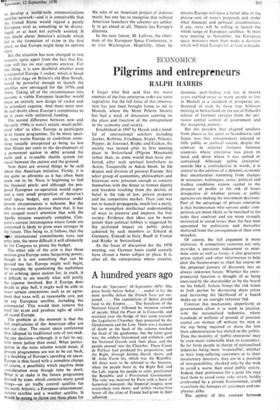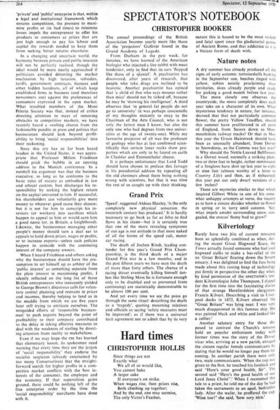ECONOMICS
Pilgrims and entrepreneurs
RALPH HARRIS
I forget who first said that the worst enemies of the free enterprise order are some capitalists: but the full force of this observa- tion has just been brought home to me in Munich, where the Mont Pelerin Society has had a week of discussion centring on the place and function of the entrepreneur in the economy and society.
- Established in 1947 by Hayek and a hand- ful of international scholars including Jewkes, Robbins, Friedman, Stigler, Polanyi, Popper, de Jouvenal, Ropke and Eucken, the society was named after its first meeting place in Switzerland (Pilgrim Mountain) rather than, as some would then have pre- ferred, after such spiritual forefathers as Acton, Tocqueville or Adam Smith. In the despair and division of postwar Europe, this select group of economists, philosophers and historians were prescient enough to concern themselves with the threat to human dignity and freedom resulting from the decline of belief in the rule of law, private property and the competitive market. Their aim was not to launch propaganda, much less a party, but to strengthen intellectual understanding of ways to preserve and improve the free society. Evidence that ideas can be more potent than political lobbies is suggested by the profound impact on public policy achieved by such members as Erhard in Germany, Einaudi in Italy, Rueff in France and Ropke in Switzerland.
As the focus of discussion for the 1970 meeting, our German hosts could scarcely have chosen a better subject or place. It is. after all, the entrepreneur whose creative,
dynamic, path-finding role has in twenty years enabled twice as many people to live in Munich at a standard of prosperity un- dreamed of even by those true believers meeting in Switzerland on the eve of Erhard's release of German energies from the per- vasive central control of government and the occupying powers.
But the paradox that plagued speakers from places as far apart as Scandinavia and Japan was that entrepreneurs enjoyed so little public or political esteem, despite the contrast in national fortunes between countries where enterprise was given its head and those where it was curbed or centralised. Although 'public enterprise' sounds like a contradiction in words, it is central to the analysis of a dynamic economy that uncertainties stemming from changes in resources, techniques, tastes, political and trading conditions expose capital to the prospect of profits or the risk of losses irrespective of whether private or public agencies are making the investment decisions. Part of the advantage of private enterprise is that businessmen who survive under com- petition are more likely to be matched to the tasks they confront and are more strongly motivated to avoid losses than the best men appointed by politicians and thereafter sheltered from the consequences of their own mistakes.
Of course, the full argument is more elaborate. A competitive economy not only provides a persistent inducement to mini- mise costs as well as losses; it also generates prices signals and other information to help alert the businessman to chart his course on the perpetual journey of discovery into an always unknown future. Whether the entre- preneurial function is thought of as being exercised by the shareholder or by the board on his behalf, failure brings the risk home to both parties by decreasing share prices and increasing the likelihood of a board shake-up or an outright takeover bid.
Contrast this mechanism, imperfectly as governments allow it to work in practice, with the nationalised industries, where hundreds of millions of pounds of precious capital are written off without the men at the top being required to share the loss their administration has visited on the public. Thus the morality of 'public enterprise' may be even more vulnerable than its economics. So far from people in charge of nationalised industries being more 'responsible', whether to their long-suffering customers or to their involuntary investors, they are- in a position of irresponsibility, checked only by the wish to avoid a worse than usual public outcry. Indeed, their preference for a quiet life may lead them to avoid some risks which, boldly confronted by a private businessman, could transform the fortunes of customers and em- ployees alike.
The upshot of this contrast between 'private' and 'public' enterprise is that, within a legal and institutional framework which ensures competition, the pressure to maxi- mise profits or (in bad times) to minimise losses impels the entrepreneur to offer his products to consumers at prices that are just high enough to pay his labour and capital the rewards needed to keep them from seeking better returns elsewhere.
In a changing and uncertain world, the harmony between private and public interests Will not be perfectly realised, though the ideal would be more nearly approached if politicians avoided distorting the market mechanism by high taxation, subsidies, tariffs, government contracts, licences and other hidden handouts, all of which keep established firms in business (and therefore newcomers out) against the preferences of consumers expressed in the open market. What troubled members of the Mont Merin Society was that, instead of critics directing attention to ways of removing obstacles to competitive markets, we have recently heard a swelling chorus from the fashionable pundits in press and politics that businessmen should look beyond profit- ability to bring 'social responsibilities' into their reckoning.
Since this cry has so far been heard loudest in the United States, it was appro- priate that Professor Milton Friedman should prick the bubble in an opening address to the Munich conference. In a nutshell his argument was that the business executive, so long as he conforms to the basic rules of society as embodied in law and ethical custom, best discharges his re- sponsibility by seeking the highest return on the capital entrusted to him. If successful, his shareholders can voluntarily give more money to whatever good cause they choose; but it is not for him to conscript his in- vestors (or workers) into sacrifices which happen to appeal to him or would earn him a good name (or, in Britain, a knighthood). Likewise, the businessman managing other people's money should turn a deaf ear to appeals to hold down prices, wages or profits, or to increase exports—unless such policies happen to coincide with the continuing interest of the company owners.
When I heard Friedman and others asking why the businessman should have the pre- sumption to set himself up as arbiter of the 'public interest' as something separate from the plain interest in maximising profits, I silently reflected on the long list of those British entrepreneurs who innocently yielded to George Brown's disastrous calls for volun- tary central planning and restraint in prices and incomes, thereby helping to land us in the muddle from which we are five years later still trying to extricate ourselves. The misguided efforts of 'responsible business- men' to push exports beyond the point of profitability to their company contributed to the delay in taking effective measures to deal with the weakness of sterling by divert- ing attention from reality to makebelieve.
Even if we may hope the CBI has learned that elementary lesson, its spokesman need warning that every time they use the jargon of 'social responsibility' they endorse the socialist suspicion (already entertained by too many Conservatives) that the straight- forward search for higher profits in a com- petitive market conflicts with the best in- terests of the consumer, the employee and the economy. If that superstition gains ground, there could be nothing left of the free enterprise order by the time the 'social responsibility' merchants have done with it.















































 Previous page
Previous page